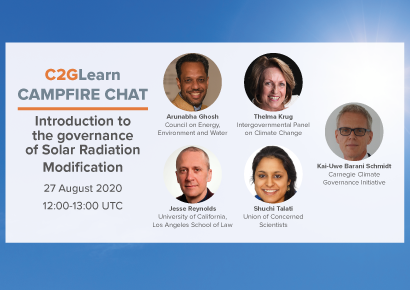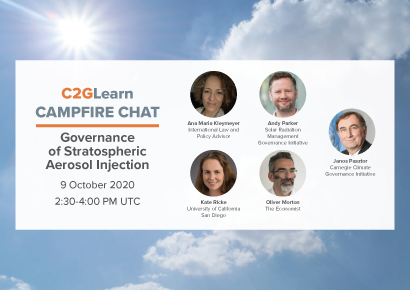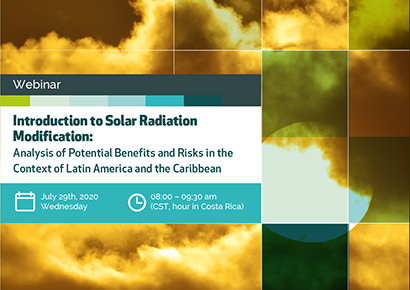Solar Radiation Modification: Governance challenges and options considering the interests of countries most vulnerable to climate change
At the Gobeshona Global Conference
20 January 2021
Current pledges made under the 2015 Paris Agreement are insufficient to keep global warming below 2°C, let alone to 1.5°C. In response, some groups are exploring the research, development and potential use of Solar Radiation Modification (SRM) as potential additional approaches to supplement mitigation efforts.
As one important proposed approach to SRM, Stratospheric Aerosol Injection (SAI) could provide potential benefits. However it could pose many physical and political risks, and significant governance challenges. The potential use or not of SAI could have the greatest implications, both positive and negative, for countries who are mostly threatened by and vulnerable to climate change.
This session explored the policy status of SRM/SAI, the potential options considering interests of highly vulnerable countries in this specific domain, and how vulnerable nations can strengthen voices and participation in shaping research and designing the governance for any research on and potential use of SRM/SAI.
Highlights
“We are very interested in ensuring that the governance structures for unleashing new technologies, if we decide to do that, are such that the most vulnerable have a say and a voice.”
Saleemul Huq
Director, International Centre for Climate Change and Development and Chair, CVF Expert Advisory Group
“It is high time that the African leadership and policymakers take a lead in this, and also be part of the process moving forward, because it’s really difficult when we try to play catch-up all the time.”
Leah Wanambwa
Senior Policy Officer, Division of Environment, Climate Change, Water and Land Management at the African Union Commission
“Our ability, as vulnerable countries, to effectively engage in SRM will be helped through efforts in areas like education, training and public awareness, which aim to build capacities.”
Emmanuel Tachie-Obeng
Environmental Protection Agency-Ghana and Fellow, Global Center on Adaptation
“Whatever threats geoengineering or SRM poses, the biggest threat is that the vulnerable countries are out of this discussion and that this comes too late to their plates.”
Red Constantino
Executive Director, International Institute for Climate and Sustainable Cities and Deputy Co-Chair, CVF Expert Advisory Group
“We don’t really own this kind of a discussion. Until and unless we build up our capacity, we understand it, and we have some sort of ownership of the knowledge, I don’t think we will appreciate it.”
Mohammed Mofizur Rahman
Research Associate, Institute for Technology and Resources Management in the Tropics and Subtropic, Cologne University of Applied Sciences, Germany
“We require the capacity to think through the governance arrangements pertaining to SRM deployment that are fair and sensitive to the situation of vulnerable countries.”
Ambuj D. Sagar
Vipula and Mahesh Chaturvedi Professor of Policy Studies & Head, School of Public Policy, Indian Institute of Technology Delhi
“From the perspective of the Climate Vulnerable Forum, I think it’s premature for us to get overly involved in the SRM debate, largely from the ‘moral hazard’ perspective.”
Mark Lynas
Author, journalist and environmental activist and visiting fellow at Cornell Alliance for Science
“There are a number of fora where potential discussions are taking place, and I think this is where the Global South can begin to act in a more substantial way.”
Janos Pasztor
Executive Director, Carnegie Climate Governance Initiative


